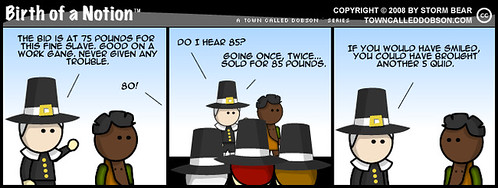 click to enlarge The history of slavery in the United States (1619-1865) began when English colonists first settled Virginia and lasted until the passage of the Thirteenth Amendment to the U.S. Constitution. Before the widespread establishment of chattel slavery, much labor was organized under a system of bonded labor known as indentured servitude. This typically lasted for several years for white and black alike, and it was a means of using labor to pay the costs of transporting people to the colonies. By the 1700's court rulings established the racial basis of the American incarnation of slavery to apply chiefly to Africans and people of African descent, and occasionally to Native Americans. In part because of the Southern colonies' devotion of resources to tobacco culture, which was labor intensive, by the end of the 17th century they had a higher number and proportion of slaves than in the North. From 1654 until 1865, slavery for life was legal within the boundaries of the present United States. Most slaves were black, and were held by whites, however some Native Americans and free blacks also held slaves. The majority of slaveholding was in the southern United States where most slaves were engaged in an efficient machine-like gang system of agriculture. According to the 1860 U.S. census, nearly four million slaves were held in a total population of just over 12 million in the 15 states in which slavery was still legal. Of all 1,515,605 families in the 15 slave states, 393,967 held slaves (roughly one in four), amounting to 8% of all American families. Most households, however, had only a few slaves. The concentration of slaves were held by planters, defined by historians as those who held 20 or more slaves. The planters achieved wealth and social and political power. Ninety-five percent of black people lived in the South, comprising one-third of the population there, as opposed to 2% of the population of the North. The wealth of the United States in the first half of the 19th century was greatly enhanced by the labor of African Americans. But with the Union victory in the Civil War, the slave-labor system was abolished in the South. This led to the decline of the antebellum Southern economy. The large southern cotton plantations became much less profitable due to the loss of the efficiencies in the gang system of agriculture. Northern industry, which had expanded rapidly before and during the war, surged even further ahead of the South's agricultural economy. Industrialists from northeastern states came to dominate many aspects of the nation's life, including social and some aspects of political affairs. The planter class of the South lost power temporarily. The rapid economic development following the Civil War laid the groundwork for the modern U.S. industrial economy. 12 million black Africans were shipped to the Americas from the 16th to the 19th centuries. Of these, an estimated 645,000 (5.4% of the total) were brought to what is now the United States. The overwhelming majority were shipped to Brazil. The slave population in the United States had grown to four million by the 1860 Census. Disclaimer:
|
Friday, April 4, 2008
Black History: Smile When You Are Sold
Subscribe to:
Post Comments (Atom)








0 comments:
Post a Comment